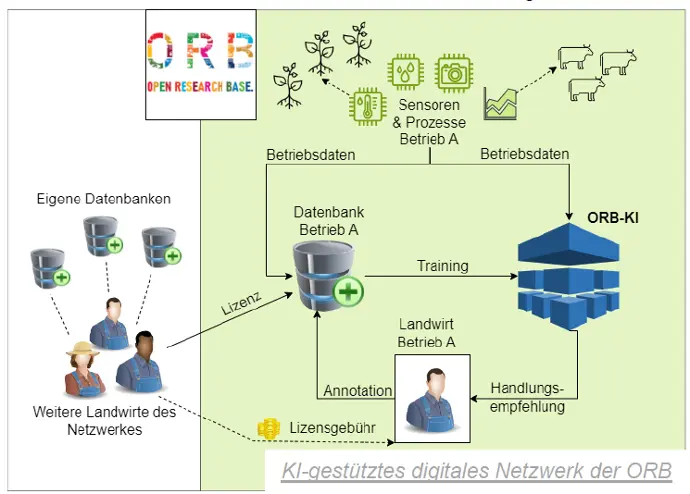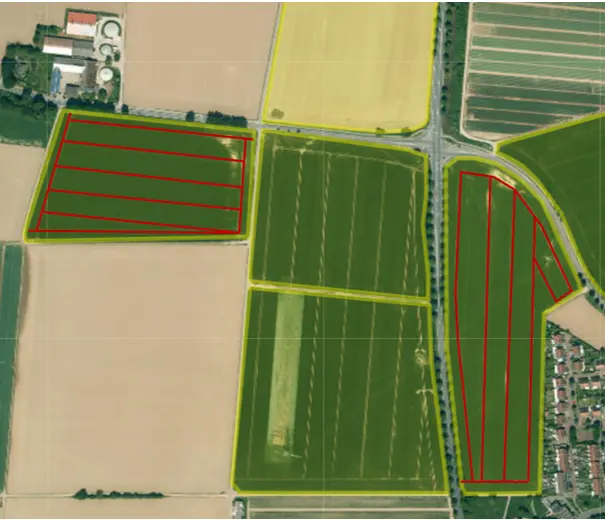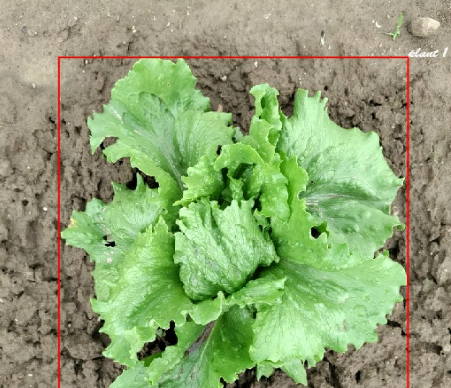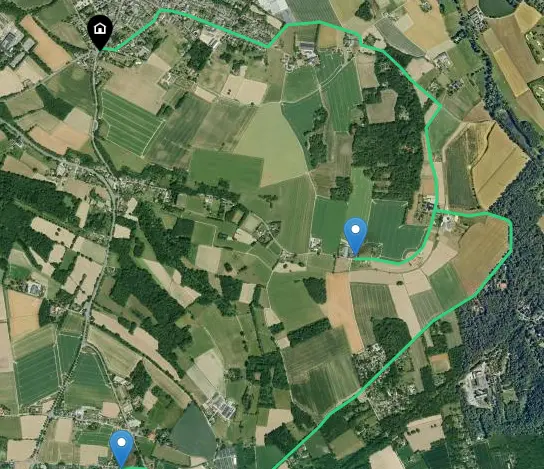ORB-FMS is a non-profit farm management system that has been specially developed for the efficient management and control of farms. ORB-FMS offers a holistic digitalisation and automation solution for farms. Based on the open-core ERP software ODOO, ORB-FMS integrates a variety of agricultural processes in a modular, customisable platform. The system enables farmers to efficiently control operational processes by providing farm management functions and bundling data from various sources. Farmers can either use the collected data themselves to make improved decisions or have it analysed by an AI that makes optimised recommendations for action. With functions that are directly tailored to the needs of agriculture, ORB-FMS not only offers digital management, but also the possibility of physical automation and the use of artificial intelligence - all developed in close collaboration with the farmers themselves.
Why an ORB farm management system?
Advantages and special features at a glance
ORB-FMS offers a unique solution for the digitalisation and automation of farms. The system has been specially developed to help farmers remain economically efficient while meeting increasing environmental and legal requirements. Here are the eight key benefits that characterise ORB-FMS:
Easy expandability and customisation
ORB-FMS enables the seamless integration of new functions and the customisation of existing modules to meet the individual requirements of farmers. This keeps the system flexible and future-proof, ensuring long-term use without dependence on expensive updates or extensions.
Avoidance of island solutions
In contrast to many other digital offerings, which often only cover specific tasks, ORB-FMS offers a comprehensive solution that maps all relevant agricultural processes on a single platform. This minimises the effort and costs associated with scattered individual solutions and improves efficiency through centralised management.
Cost efficiency and scalability
Thanks to the open-core approach, ORB-FMS avoids expensive licence models and subscription traps. Farmers have full control over their software and can flexibly organise and expand its use without being tied to rigid price structures or individual providers and platforms. This means that ORB-FMS remains attractive and affordable even for small and medium-sized farms.
Agriculture-specific functionalities
ORB-FMS is characterised by its adaptation to the specific requirements of agriculture. In contrast to conventional ERP systems, ORB-FMS offers special functions such as digital field maps, plant databases and modules for herd management. These agriculture-specific enhancements enable farmers to precisely control and optimise their operational processes, taking the system far beyond the capabilities of general ERP solutions. A particular advantage is the ability to customise new functions to the individual needs of farmers.
*** Translated with www.DeepL.com/Translator (free version) ***
Artificial intelligence and data sovereignty
ORB-FMS enables the creation of comprehensive agricultural data sets through automated data collection, which serve as a basis for the use of artificial intelligence (AI). Farmers can create their own data sets and annotate them manually or automatically to make them usable for training AI models. The trained AI can provide optimised recommendations for action based on real-time farm data. A key advantage: the data sets remain entirely in the possession of the farmers, which means they remain independent of third-party providers in the AI sector. Within the ORB, these databases can be shared or traded, which promotes the collective exchange of knowledge.
Development together with farmers
ORB-FMS is not only developed for farmers, but above all together with them as key players. As members of the ORB, farmers have the opportunity to actively participate in the further development of the system. They can define requirements, provide impetus for development and test partial results on their farms under real conditions at an early stage. This practical development approach ensures that ORB-FMS offers real, useful solutions that meet the daily requirements of agriculture. The result is a system that not only meets the needs of farmers, but is also co-designed by them.
Hardware integration and automation
By connecting to the Robot Operating System (ROS), ORB-FMS enables the seamless integration of hardware components such as sensors and actuators. This interface lays the foundation for the automation of agricultural processes by collecting and processing real-time data from devices and machines and integrating it directly into the operational control system. This makes ORB-FMS the central platform that supports both the digital management and physical automation of agriculture.
Agriculture-specific functions of ORB-FMS
Plant database with annotation tool
ORB-FMS offers a comprehensive plant database that stores both image data and important metadata such as plant, type, BBCH value, date, field and position. This data can be entered manually or recorded automatically by sensors.
The metadata is easy to edit within ORB-FMS. The annotation of image data can either be manually via the integrated annotation tool, which allows farmers to incorporate their expertise directly, or automatically to prepare the training of machine learning models.
Annotated datasets remain the property of the farmer and can be shared or traded within ORB-FMS. By building and owning their own annotated databases, farmers remain independent of third-party providers in the field of artificial intelligence.

Field-to-fork direct marketing
The ORB-FMS field-to-fork strategy offers farmers digital technologies and infrastructures to market their products regionally and without intermediaries. ORB-FMS integrates modules for sales, warehouse management, web shops as sales channels and route planners for efficient transport to the customer, thus offering a holistic process chain.
The integration of fully automated robots such as DAVEGI into the direct marketing chain offers particular potential. The DAVEGI concept, which is being developed together with AI.Land GmbH, is based on spot farming, in which each plant is individually monitored and cared for. Unlike conventional agricultural robots, which struggle with range and terrain difficulties, DAVEGI utilises a circular traverse that rotates around a fixed point, creating a stable environment for robust automation. The main movements are performed by carriages that are precise and energy-efficient. Sensors recognise and classify crops, weeds and pests, allowing different types of vegetables to be grown in parallel and harvested optimally.
DAVEGI is still under development, but the planned integration into ORB-FMS will enable centralised monitoring and control of the entire value chain - from production to delivery. This combination offers farmers the opportunity to meet ecological and economic challenges and offer consumers regional, healthy products. The field-to-fork strategy strengthens regional value chains, reduces transport routes and packaging material and promotes sustainable agriculture through local, diverse and seasonal cultivation methods.

Stable and herd management
The ORB-FMS barn and herd management module aims to develop a comprehensive solution for managing and optimising animal husbandry. The plan is to offer farmers a platform in the future that enables them to record and analyse important data on feeding, health, reproduction and the use of medication for their animals, as well as data on stable conditions. The planned integration of this data into ORB-FMS should enable farmers to make informed decisions to increase productivity and improve animal welfare, while at the same time taking into account legal requirements and sustainability standards.
In addition to the functions of conventional barn management and monitoring systems, the ORB-FMS herd management module will combine sensor technology with advanced artificial intelligence-supported data analysis in order to further optimise animal husbandry. The plan is to use sensors and cameras to automatically record barn conditions and behavioural data such as gait profiles or drinking behaviour of cows. This data is to be fed into a machine learning-based early warning system that quickly identifies unusual behaviour and possible health problems in the animals and provides farmers with specific explanations and recommendations for stable and herd management or makes immediate adjustments to stable conditions.
Thanks to the flexible connection to sensors and cameras, ORB-FMS should be able to provide critical indications of diseases, pain or stress factors at an early stage so that farmers can react immediately. In future, farmers will be able to add their specific expertise to the data sets through annotations in order to further refine the systems and adapt them to the needs of their farm. The desired result is targeted, automated recommendations for action that improve animal health, reduce the use of medication and increase the efficiency of operational processes. ORB-FMS could thus support optimised barn management and help farmers to keep animals sustainably.
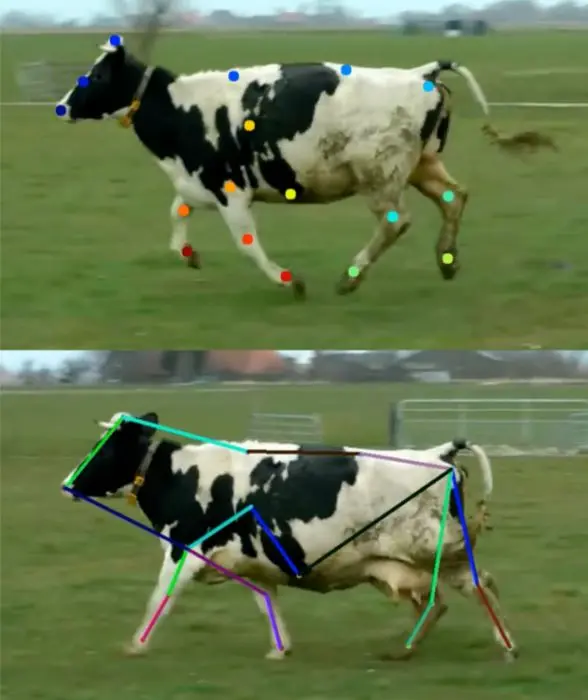
Liberal AI for agriculture
ORB-FMS enables the creation of comprehensive agricultural data sets through automated data collection, which serve as the basis for the use of artificial intelligence. Farmers can create their own plant databases, herd management data and many other data sets. This data can either be annotated manually using an integrated annotation tool - taking into account the specific expertise of the farmer - or automatically to make it usable for training open (liberal) AI models.
The trained AI can continuously analyse collected real-time farm data and make optimised recommendations for cultivation, care and harvesting based on this. A key benefit is that the annotated datasets remain fully owned by the farmers, keeping them independent of third-party AI providers. Within ORB-FMS, these databases can be shared or traded as required, which promotes collective knowledge sharing and creates additional added value. This allows farmers to retain control over their data while benefiting from a network that supports shared knowledge and sustainable innovation in agriculture.
